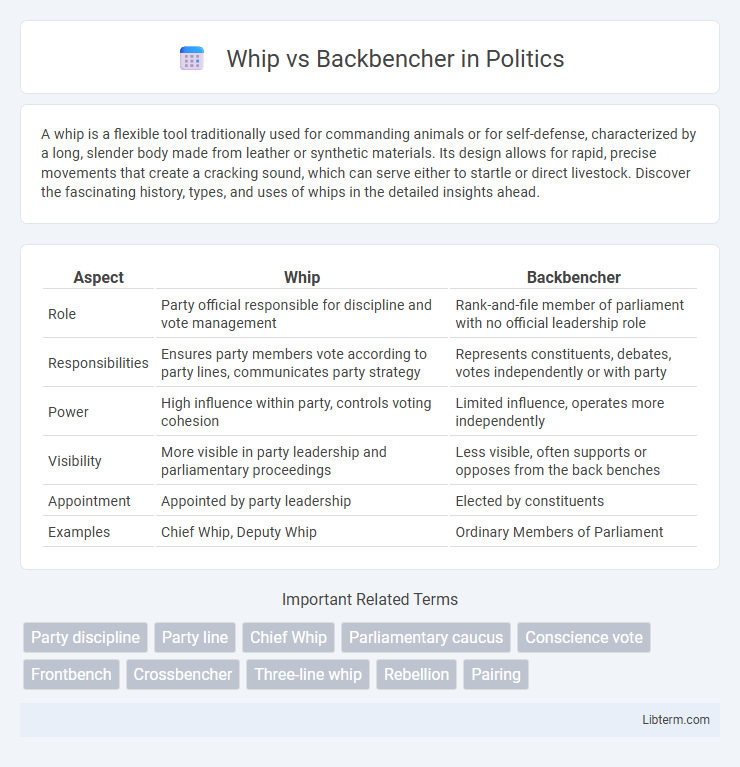A whip is a flexible tool traditionally used for commanding animals or for self-defense, characterized by a long, slender body made from leather or synthetic materials. Its design allows for rapid, precise movements that create a cracking sound, which can serve either to startle or direct livestock. Discover the fascinating history, types, and uses of whips in the detailed insights ahead.
Table of Comparison
| Aspect | Whip | Backbencher |
|---|---|---|
| Role | Party official responsible for discipline and vote management | Rank-and-file member of parliament with no official leadership role |
| Responsibilities | Ensures party members vote according to party lines, communicates party strategy | Represents constituents, debates, votes independently or with party |
| Power | High influence within party, controls voting cohesion | Limited influence, operates more independently |
| Visibility | More visible in party leadership and parliamentary proceedings | Less visible, often supports or opposes from the back benches |
| Appointment | Appointed by party leadership | Elected by constituents |
| Examples | Chief Whip, Deputy Whip | Ordinary Members of Parliament |
Introduction to Whips and Backbenchers
Whips are party officials responsible for maintaining discipline and ensuring party members vote according to the party line in legislative assemblies. Backbenchers are members of parliament or legislators who do not hold ministerial or official party leadership positions, often representing the general membership. The dynamic between whips and backbenchers plays a crucial role in shaping party cohesion and legislative decision-making.
Defining the Role of a Party Whip
A party whip serves as a crucial link between party leadership and members, responsible for maintaining discipline, ensuring attendance, and securing votes on key legislation. Whips communicate party strategies, monitor voting intentions, and persuade backbenchers to align with party policies. Unlike backbenchers who primarily represent their constituencies and may influence party direction, whips actively enforce party cohesion and manage legislative agenda execution.
Who Are the Backbenchers?
Backbenchers are members of a parliament or legislative assembly who do not hold governmental office or official party leadership roles, positioning them behind the frontbenchers like ministers and party whips. They play a crucial role in representing their constituents, influencing legislation through committee work, and serving as a check on government power. Unlike whips, who enforce party discipline and manage legislative agendas, backbenchers have greater independence in voting and voicing opinions.
Key Responsibilities: Whip vs Backbencher
Whips are responsible for party discipline, ensuring members attend votes and follow the party line, and managing parliamentary business to maintain order and cohesion. Backbenchers focus on representing their constituents' interests, contributing to debates, and scrutinizing government policies without holding official party leadership roles. While whips influence party strategy and voting outcomes, backbenchers drive grassroots engagement and legislative oversight.
Influence on Legislative Process
The Whip plays a critical role in the legislative process by ensuring party discipline, coordinating voting strategies, and mobilizing members to support or oppose bills, which directly influences legislative outcomes. Backbenchers, although less influential individually, can impact legislation by voicing constituency concerns, participating in debates, and occasionally forming alliances to sway party decisions. The dynamic between Whips and Backbenchers shapes the flow and success of legislation through negotiation, pressure, and representation within the parliamentary system.
Whips and Party Discipline
Whips play a crucial role in maintaining party discipline by ensuring members vote according to party lines, using persuasion and sometimes sanctions to secure attendance and loyalty. Their effectiveness directly impacts legislative outcomes, as they coordinate communication between party leadership and backbenchers who often challenge party directives. Strong party discipline enforced by whips helps maintain unity and control within parliamentary systems, preventing defections and legislative gridlock.
Backbenchers’ Power and Limitations
Backbenchers hold significant power through their ability to influence party decisions and policy directions by leveraging internal party debates and voting blocks. Despite their influence, backbenchers face limitations such as restricted access to key leadership roles and limited direct control over legislative agendas. Their effectiveness often depends on strategic alliances and the broader political context within the parliament.
Career Path: From Backbencher to Whip
A backbencher typically begins their political career supporting party policies and gaining experience through committee work and constituency engagement. Progressing to a whip role requires demonstrating strong organizational skills, party loyalty, and the ability to manage fellow legislators' attendance and voting behavior effectively. Advancing from backbencher to whip often involves building trust with party leadership and showing strategic influence within the parliamentary party structure.
Whips in Different Parliamentary Systems
Whips in parliamentary systems serve as crucial party enforcers, ensuring discipline among members and securing votes during legislative sessions. In the UK, whips are ranked from Chief Whip to junior whips, managing party cohesion through a structured system of communication and sanctions. In contrast, Canadian and Australian parliaments assign similar roles but often adapt whip responsibilities to the specific political culture and party dynamics within their legislatures.
The Impact of Whips and Backbenchers on Democracy
Whips play a critical role in maintaining party discipline and ensuring legislative efficiency by coordinating voting strategies, which can streamline the decision-making process but may suppress individual MPs' dissent and debate. Backbenchers, representing the interests of their constituents without executive responsibilities, provide essential checks on government power by raising diverse viewpoints and holding leaders accountable. Together, the interaction between whips and backbenchers balances party cohesion with democratic representation, influencing legislative accountability, transparency, and the overall health of parliamentary democracy.
Whip Infographic

 libterm.com
libterm.com